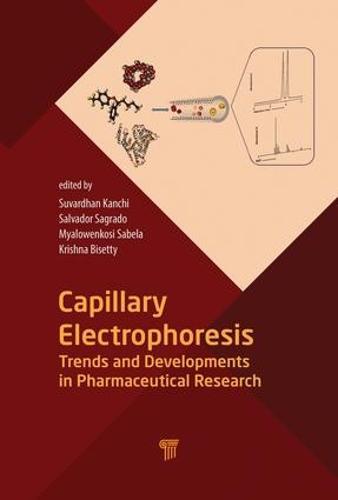Overview
Capillary electrophoresis (CE) has become an established method with widespread recognition as an analytical technique of choice in numerous analytical laboratories, including industrial and academic sectors. Pharmaceutical and biochemical research and quality control are the most important CE applications. This book provides a comparative assessment of related techniques on mode selection, method development, detection, and quantitative analysis and estimation of pharmacokinetic parameters and broadens the understanding of modern CE applications, developments, and prospects. It introduces the fundamentals of CE and clearly outlines the procedures used to mitigate several barriers, such as detection limits, signal detection, changing capillary environment, resolution separation of analytes, and hyphenation of mass spectrometry with CE, for a range of analytical problems. Each chapter outlines a specific electrophoretic variant with detailed instructions and some standard operating procedures. In this respect, the book meets its desired goal of rendering assistance to lovers of electrophoresis.
Full Product Details
Author: Suvardhan Kanchi (Durban University of Technology, South Africa) ,
Salvador Sagrado (University of Valencia, Spain) ,
Myalo I. Sabela (Durban University of Technology, South Africa) ,
Krishna Bisetty (Durban University of Technology, South Africa)
Publisher: Pan Stanford Publishing Pte Ltd
Imprint: Pan Stanford Publishing Pte Ltd
Weight: 0.818kg
ISBN: 9789814774123
ISBN 10: 981477412
Pages: 396
Publication Date: 10 August 2017
Audience:
Professional and scholarly
,
College/higher education
,
Professional & Vocational
,
Postgraduate, Research & Scholarly
Format: Hardback
Publisher's Status: Active
Availability: In Print

This item will be ordered in for you from one of our suppliers. Upon receipt, we will promptly dispatch it out to you. For in store availability, please contact us.
Reviews
Decades after its introduction, capillary electrophoresis has evolved into a mature technique, especially in the field of pharmaceutical analysis. This book focuses on a number of fields in which this separation technique has proven its unique usefulness, such as chiral separations and the analysis of protein biopharmaceuticals. It highlights the current state of the art and offers high-quality general chapters and overviews as well as topical chapters. Recommended reading for all those involved in pharmaceutical analysis, albeit academically or industrially! -Prof. Ann Van Schepdael, University of Leuven, Belgium
Decades after its introduction, capillary electrophoresis has evolved into a mature technique, especially in the field of pharmaceutical analysis. This book focuses on a number of fields in which this separation technique has proven its unique usefulness, such as chiral separations and the analysis of protein biopharmaceuticals. It highlights the current state of the art and offers high-quality general chapters and overviews as well as topical chapters. Recommended reading for all those involved in pharmaceutical analysis, albeit academically or industrially! -Prof. Ann Van Schepdael, University of Leuven, Belgium
Author Information
Suvardhan Kanchi is a research scientist in the Department of Chemistry, Durban University of Technology (DUT), South Africa. His current research involves method development to separate organic and inorganic molecules from environmental samples using CE. He is also interested in fabrication of electrochemical nano-biosensors for high-intensity artificial sweeteners, bisphenols, and dyes. Salvador Sagrado is full professor in the Department of Analytical Chemistry, Universitat de València (UV), and secretary of the Interuniversity Research Institute for Molecular Recognition and Technological Development (IDM), Universitat Politècnica de València, Spain. His current research focuses on chemometrics and enantioselectivity. Myalowenkosi Sabela is currently conducting doctoral research at DUT and has been a recipient of the Erasmus Mundus-EUROSA fellowship 2014–2015. His research interest is in pharmacokinetic and enantioselective parameters of pharmaceutical compounds in the presence of biomacromolecules and nanoparticles for applications such as diagnostics and sensors. Krishna Bisetty is head of the Department of Chemistry at DUT. His current research is largely based on high-performance computing ranging from small organic molecules to bioactive macromolecules including the development of computational models for the design of more effective host–guest systems using state-of-the-art molecular dynamics and docking simulations supported by experimental studies.




